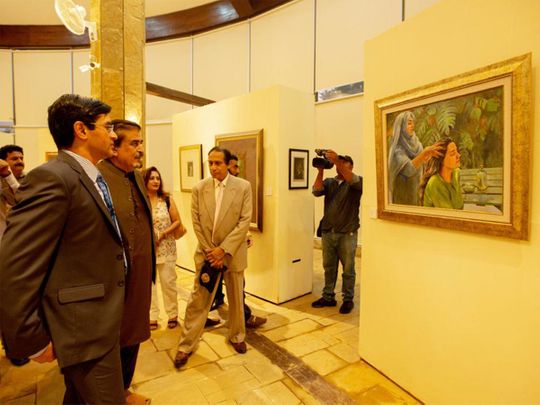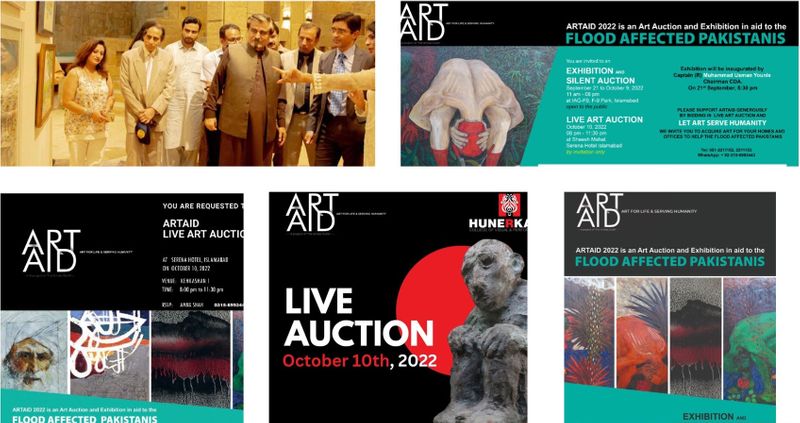
A few weeks later, not much has changed. The aftermath of Pakistan’s terrifying floods is slowly unveiling its enormity. So much destruction, so much death, so much displacement, so much loss, so much disease, so much scarcity of drinking water, food, and essential medicines, and so little of everything that matters. Shelter-less millions suffering from curable but terrible diseases like dengue and malaria; children dying of waterborne infections; people in donated clothing dreading the merciless winter that is coming; entire communities eating too little to nourish their emaciated bodies, their tired minds. Those who were poor but had a home, a family, a livelihood, and a future are forced to accept nothingness as their single reality. All of them waiting for something to give. All of them gripping silvers of hope not ready to give up. Just yet.
The government is doing its best, restrained within its limited resources and haphazard priorities. Political battles are the loud white noise on mainstream and social media that muffles the cries of flood victims. While the entire nation’s unity and one-mindedness are essential for mitigation of issues caused by floods, polarization cuts like a knife even the best intentions. Amidst the hundreds of tweets on my timeline every day, I have a difficulty finding even one on the plight of flood victims. In very little time, more than thirty-three million Pakistanis and their raw bleeding untreated agony is a footnote in private, public, and governmental consciousness.
But then there are those who reiterate my trust in the power of humanity doing what it does best—be there for those who are on verge of giving up hope. Our citizens who help without attaching a tag to their generosity, our NGOs who constantly work to make a difference in the lives of those who have lost almost everything, international organizations whose empathy is border-less, visa-less, identity-less. They are the ones who shine, they are all my heroes. Those who are doing their best to create ease in the displaced, desolate, broken lives of millions of my terrified but always brave compatriots. These heroes hold the hands of the displaced desolate broken people to say: they are not alone, their pain is not unheard, their lives are not over.
Jamal Shah, one of Pakistan’s most renowned artists, is one of those remarkable people who care. His ARTAID is working on different programmes to help Pakistan’s flood victims. Shah’s empathy is not a new phenomenon, his humanitarian work is decades old. Started in the early 1990s as art auctions for fundraising for philanthropic causes, a project of the Hunerkada College of Visual and Performing Arts, ARTAID came into existence in 2005.
Shah—recipient of multiple awards, both nationally and internationally—is as versatile as the subjects of his art—sculptor, painter, actor, writer, director, and founder of the Fine Arts Department of University of Balochistan, Quetta; Hunerkada College of Visual and Performing Art; and ARTAID.
Since the last few weeks, Shah’s attention and ARTAID are exclusively focused on helping the flood victims of Pakistan.

For Gulf News, I asked Jamal Shah, Founder and Chairperson ARTAID, a few questions:
Mehr Tarar: What is your assessment of the devastation of the 2022 floods?
Jamal Shah: The available data is devastating as it shows that the floods, caused by melting of our glaciers and unprecedented rainfall, are because of the effects of climate change, even though Pakistan produces less than one percent of the global greenhouse gas emissions.
Many parts of the country have suffered unquantifiable damage to infrastructure, houses, and cultivable land. Water that has flooded almost one-third of the country has robbed more than thirty-three million people of their homes and livelihood. Over 1,600 people have lost their lives, the large number is that of children and women.
People in areas that are still submerged are faced with compounded effects of food insecurity, insufficient shelter, waterborne diseases, lack of medical facilities, sociocultural apprehensions, and hopelessness. Whereas the not-so-satisfactory rescue and relief phase has exposed the apathy of many champions of democracy and self-styled representatives of people, government’s resourceless response is also showing glaring gaps. Thanks to the humanitarian spirit of local NGOs and relief assistance provided by international organizations and countries, people have not yet protested against decision makers and political leadership. Perhaps, it is the understanding of the overwhelming magnitude of devastation that is keeping victims of floods quiet so far.
How does the ARTAID propose to help the flood affected people of Pakistan?
Many local NGOs and philanthropists have, so far, responded in the most commendable manner, which has kept people’s faith alive despite extreme helplessness faced by them in their lives, moment to moment. ARTAID, being a response to the belief that art is always for life, was founded in 2005 after the devastating earthquake in Pakistan. ARTAID organized the country’s first ever live art auction in a telethon, in collaboration with PTV, to raise funds through sale of artworks collected from all Pakistan. The auction was very successful, and we were able to contribute to president of Pakistan’s earthquake relief fund.
Similar activities continued in 2010 for the flood affected Pakistanis, and in 2019, for the victims of coronavirus enforced lockdown.
In response to the latest devastation, the artist community, always alert, always responsive, has voluntarily contributed their creations to ARTAID, urging us to help our people in need. ARTAID, this time, has received works in unprecedented numbers, and that is the reason why we planned an exhibition, a silent auction, and a live art auction to sell the donated work and raise funds to help our people.
What is different this time is ARTAID has received paintings, prints and photographic works from artists of Belgium, India, Pakistan, Portugal, Sweden, Spain, UK, and US, all of which will be auctioned live in front of mixed audiences. We hope to raise respectable amounts, not just in cash but also in the form of in-kind contribution against works of art as barter.
We have focused our first auction on Balochistan and will be distributing goods with the help of the Balochistan Rural Support Programme. We also plan to hold more auctions for Sindh, the most devastated region in 2022 floods, and other areas.
Our campaign will also include mega musical concerts.
What, currently, are the major requirements in the flood-ravaged areas?
At the moment, the major requirements are clean drinking water, temporary shelter, warm clothing, food, and medical aid. After that, the focus will be on construction of houses, reclaiming of displaced people’s lands, and arranging sources of livelihood. And most importantly, we need safeguards against future effects of climate change. That entails major planning in terms of construction of new water reservoirs, bridges, and roads, keeping in mind the natural pathways of floodwater.
Being involved in fund raising for people in urgent need, what do you think are the main issues vis-à-vis providing immediate aid and ensuring long-term rehabilitation of the millions of flood victims?
What is required: robust infrastructure, eco-friendly planning, and construction of more waterways, small dams, and reservoirs that can hold and store excess water, which should be directed to regions with the lowest water table.
Rehabilitation of thirty-three million people is the most important challenge for the entire country and not just the government. A considerable percentage of the flood-affected population has already migrated to bigger cities, a situation that is bound to create socioeconomic challenges in those cities.
Another urgent issue that must be paid attention to is the agricultural land. Most of the lands will take some time to return to a cultivable stage, and that will create food insecurity.
The cultural aspect is also very important as countless artisans, musicians and artists have lost their workplaces. The new plan must include rebuilding of the cultural infrastructure.










